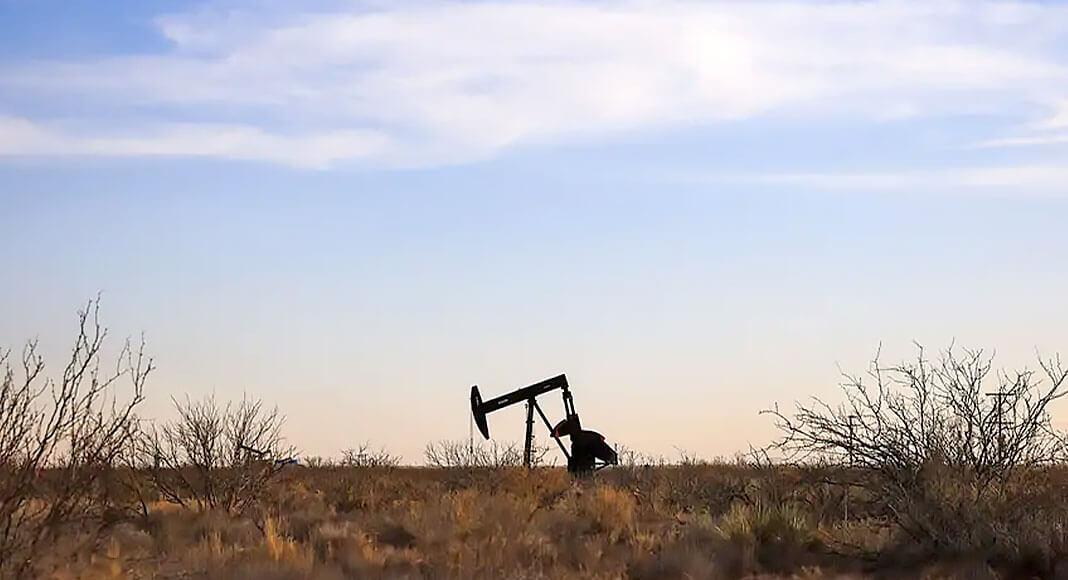
The Texas Tribune
WASHINGTON — U.S. leaders on Monday inched closer toward banning Russian oil from the American economy, drawing support from Texas Republicans and Democrats in Washington.
“Symbolically, the idea that we’re funding [Russian president Vladamir] Putin’s war machine and, quite frankly, genocide that we’re seeing on the television, that has to stop,” Republican U.S. Rep. Michael McCaul said on CNN, referring to Russia’s invasion of Ukraine at the end of February.
But there was less agreement nationally in how the U.S. should go about replacing the Russian import, which makes up about 7% of all U.S. oil imports. Texas Republicans spent much of Monday demanding nearly unfettered drilling and pipeline usage across North America, policies Biden officials refused to endorse.
Calls for increased U.S. oil production had support from at least one Texas Democrat, U.S. Rep. Filemon Vela, of Brownsville.
“Save Ukraine! Unleash American Oil and Gas!” he said on Twitter, eschewing the national party reluctance to increasing drilling out of concern for environmental impact. Vela could not immediately be reached for comment.
But not every Texan was on board.
“We should have long ago weaned ourselves off of fossil fuels (especially foreign oil) and invested in solar and wind energy, but there has historically been strong Republican opposition to investing in renewable energy that would’ve allowed us to have that energy independence,” U.S. Rep. Veronica Escobar, an El Paso Democrat, told The Texas Tribune.
“We must stop buying oil from Russia and expedite our investment in renewable energy,” she added.
The deal to ban Russian energy imports would be the latest step in a worldwide effort to punish Russia for its unprovoked invasion into Ukraine. U.S. Rep. Lloyd Doggett, a senior Democrat who is involved with the drafting of the bill, said the legislation could come up for a vote as soon as Tuesday.
Such dramatic action will almost certainly impact Texas’ oil and gas industry, with companies likely to see short-term profits as they try to increase production to help meet the world’s energy needs. But if a large amount of Russian oil and gas were to no longer be on the global market, Texas alone would not be able to make up the difference.
On Sunday, U.S. Secretary of State Antony Blinken sent oil prices jumping after a CNN appearance in which he said the United States is “now talking to our European partners and allies to look in a coordinated way at the prospect of banning the import of Russian oil, while making sure that there is a still an appropriate supply of oil on world markets.”
McCaul, an Austin Republican and the top House Republican on foreign affairs policy, met with Blinken over the weekend in Poland and said he encouraged Blinken to pursue stopping Russian energy imports, adding that energy is “a lifeblood for Putin. And I believe he’s using that money to spill blood in Ukraine.”
An American ban likely would have only a small impact on the Russian economy. The more consequential — and diplomatically difficult — move would be if Ukrainian allies in Europe joined the American ban.
Western Europe is far more reliant on Russian energy, a sticking point between U.S. Sen. Ted Cruz and the Biden administration in the lead-up to the Russian invasion. Throughout 2021, Cruz blocked President Joe Biden’s nominees to the U.S. State Department in response to Biden’s decision to lift sanctions against a company that runs Russian gas to Germany through a pipeline known as Nord Stream 2.
Eventually, the Biden administration reinstated the sanctions and Germany dropped the pipeline altogether. Even so, Germany has expressed reluctance to pursue Russian oil bans.
ExxonMobil CEO Darren Woods said Monday he anticipates a “tough time” ahead, as the threat of removing any source of supply impacts the global market.
“People everywhere are worrying about the availability and affordability of energy,” Woods said Monday at the opening of CERAWeek, an annual global energy conference in Houston.
Higher oil prices will impact almost all Texas consumers, including inflated gasoline prices, but also will create opportunities in the oil and gas sector.
In 2020, Russia was the world’s third-largest petroleum producer and second-largest natural gas producer, according to the U.S. Energy Information Administration.
In response to potential cuts to the energy supply, Texas Republicans flooded social media on Monday morning demanding an expansion of domestic production.
The president “must open the Keystone Pipeline, restart drilling on federal lands, and unleash American energy independence,” U.S. Rep. Beth Van Duyne, an Irving Republican, wrote on Twitter.
“Today, the U.S. is producing oil at record numbers and it still isn’t enough for them,” Escobar countered. “Republicans can’t keep talking out of all sides of their mouths.”
“They can’t decry our dependency on foreign oil, complain about rising gas prices AND stand in the way of a clean energy future,” she added. “We must stop buying oil from Russia and expedite our investment in renewable energy.”
The White House showed little appetite for reinstating the Keystone Pipeline permits and increased drilling on federal lands when asked on Monday.
White House press secretary Jen Psaki suggested oil companies take advantage of existing drilling permits on private land and move toward renewables.
“If we’re looking to the future and what … we can do to prevent this from being a challenge in future crises, the best thing we can do is reduce our dependence on fossil fuels and foreign oil,” she said.
But permits allowing companies to drill does not mean they will automatically produce oil and gas. The permits just mean they are allowed to search for commercially feasible oil and gas.
The Keystone XL Pipeline is a decades long project, begun in the mid-2000s, that transports oil underground from Canada into Nebraska and then elsewhere in the U.S. A portion of the pipeline system has already been built through East Texas and delivers crude oil to Port Arthur’s refineries. Environmental and Native American groups oppose it on environmental grounds. On his first day in office, Biden canceled the pipeline’s permits for future construction of the project.
Congress is also expected this week to appropriate additional billions in aid to Ukraine. U.S. Rep. Chip Roy, an Austin Republican, called any funding not tied to completing construction of U.S. pipeline systems, allowing oil drilling on federal lands and offshore “a FAIL.”
U.S. Rep. Lizzie Pannill Fletcher, D-Houston, late last week announced a legislative proposal that would allocate money to assist European countries to develop, produce or procure equipment and resources that will reduce the region’s dependency on Russian natural gas, petroleum and nuclear energy. The sophomore congresswoman is also expected to imminently introduce legislation that would expedite liquefied natural gas exports to NATO countries.
Republicans hammered Biden after reports surfaced on Sunday that administration officials traveled to Venezuela, a Kremlin ally, to discuss lifting sanctions there.
U.S. Sen. John Cornyn, a Texas Republican, said: “Why on earth would we trade one oil-rich dictator for another?”
A Monday Axios report stated Biden officials were planning a separate trip to Saudi Arabia with an aim to boost their oil production and exports. U.S. Energy Secretary Jennifer Granholm is scheduled to speak at the Houston conference on Wednesday and is expected to meet with her counterparts from Saudi Arabia and other countries.
“You know your brain is broken when you think foreign oil is better for the environment than American oil,” wrote U.S. Rep. Dan Crenshaw, a Houston Republican.
An outside group aligned with former Vice President Mike Pence announced early Monday that it would spend $10 million on a television ad campaign targeting 16 Democrats in the lead-up to the midterm elections this November, including four Texans: U.S. Reps. Colin Allred of Dallas, Henry Cuellar of Laredo, Fletcher and Vicente Gonzalez of McAllen.
“Joe Biden caved to the radical environmentalists and stopped America’s Keystone Pipeline and dramatically increased Americans’ dependence on Russian oil, endangering America’s security and helping Russia fund their invasion,” the ad says, according to Axios.
Almost immediately after the announcement of the ad campaign, Allred indicated his impatience with Pence’s hawkish political case. Calling the advertising campaign “abhorrent,” Allred said “Pence and the GOP [are using] the war in Ukraine to score cheap political points.”
“Ukrainians are fleeing their homes and losing family members to a senseless invasion by a murderous dictator,” he added.
Allred then pointed to a 2019 call between then-President Donald Trump and Ukrainian President Volodymyr Zelenskyy, in which the American president threatened to withhold military aid from Ukraine unless Zelenskyy launched a political prosecution of Biden’s son.
“This is the same vice president who stood with Trump as he cozied up to Putin and did nothing while he blackmailed the Ukrainians and withheld the arms they needed to defend themselves,” Allred added.












